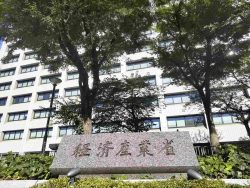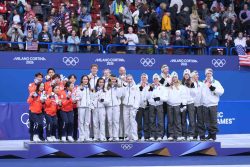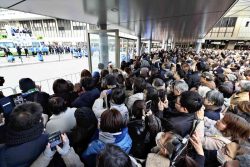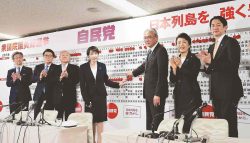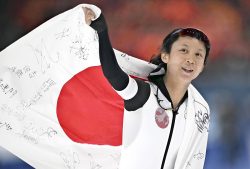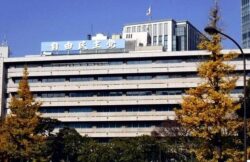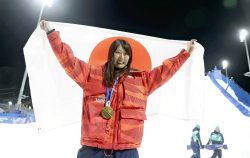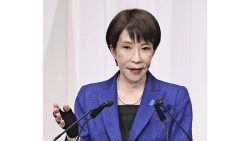Politics Behind Japan-ROK Agreement on Defense Exchanges; Differences Outweighed Shared Concern Over North Korea

Defense Minister Minoru Kihara, left, shakes hands with his South Korean counterpart Shin Won-sik on Saturday in Singapore.
1:00 JST, June 3, 2024
SINGAPORE — At a Japan-South Korea defense ministers’ meeting held Saturday, the Japanese and South Korean sides had to reach a political settlement in order to agree to resume bilateral defense exchanges, putting the issue of a 2018 fire-control radar directing incident behind them.
This is because the two governments placed importance on enhancing their cooperation to deal with North Korea. The task of Tokyo and Seoul going forward will be to rebuild trusting relations between members of their defense forces.
“It is important to promote defense cooperation not only between Japan, the United States and South Korea, but also between Japan and South Korea,” Defense Minister Minoru Kihara told his South Korean counterpart Shin Won-sik at the outset of their talks held on the sideline of the Shangri-La Dialogue defense summit in Singapore.
Shin responded that he wanted to engage in frank discussions on future-oriented security and defense cooperation.
The two defense chiefs then shared a firm handshake. However, preparatory negotiations between defense officials of the two governments had continued until the day of the bilateral talks.
Even after the inauguration of South Korean President Yoon Suk Yeol’s administration, which places importance on the country’s relations with Japan, Seoul has maintained that the radar incident — in which a South Korean Navy ship directed its fire-control radar at a Maritime Self-Defense Force patrol aircraft in December 2018 — never took place.
Instead, the South Korean National Defense Ministry has repeatedly maintained its argument that the MSDF patrol aircraft carried out a dangerous, threatening low-altitude flight against the South Korean destroyer.
In an effort to resolve the situation, the Japanese side shifted its tactic to seeking agreement on measures that would be effective to prevent such incidents in the future rather than disputing the facts. Thus, the Japanese side pushed to include compliance with the Code for Unplanned Encounters at Sea (CUES) as a main pillar of the agreements.
In response, the South Korean side requested including restrictions on allowable distances and altitudes when aircraft approach vessels, with a view to preventing MSDF aircraft from approaching South Korean vessels.
The Japanese side did not accept this request, viewing it as an infringement of freedom of navigation and flight. But the Japanese side gave consideration to the South Korean side and the document about prevention of a reoccurrence explicitly stated that the CUES requires safe distances to be maintained.
Rising Sun Flag
A point of contention that emerged in the final phase of the preparatory negotiations was the handling of the SDF’s use of the Rising Sun Flag. The flag is viewed as “the flag of war crimes” by some people in South Korea. When the administration of then South Korean President Moon Jae-in demanded Japan that the flag not be flown at an international naval review ceremony to be held in South Korea in 2018, the MSDF, in response, decided not to participate in the ceremony.
This time, the Japanese side sought to draw confirmation from South Korea that there would be no problem flying the SDF flag. But the South Koreans hardened their attitude, saying that they would be willing to forgo the agreement, and finally the Japanese side conceded by not including items related to this issue in the agreements.
Even so, the Yoon administration allowed an MSDF destroyer to fly the SDF flag when it entered Busan Port in May of last year before participating in a multilateral military exercise. Thus, Kihara came to think, “It is our assessment that the Self-Defense Force flag is not an obstacle.”
Dissatisfaction
A reason that the two sides came to a compromise is the growing need for Japan and South Korea to jointly deal with North Korea as it strengthens its nuclear and missile capabilities. While cooperation within the framework of Japan, the United States and South Korea has deepened through such measures as the immediate sharing of information on missile launches, strengthening security cooperation between Japan and South Korea has become an issue for further enhancing deterrence and response capabilities.
Japan has been putting energy into defense cooperation with such countries as Australia, India and the Philippines. However, even before the radar-directing incident, Japan and South Korea only conducted such events as joint search-and-rescue drills. Japan hopes to hold reciprocal visits of uniformed defense officers and other personnel between Tokyo and Seoul frequently, and to realize a two-plus-two foreign and defense chiefs meeting.
There is some dissatisfaction within the Defense Ministry and the SDF over the political settlement that left the issue of the radar-directing incident ambiguous. One senior SDF official said, “The Japanese side is not solidly united either,” acknowledging the lingering uneasiness among SDF officers and personnel. “We should not be trapped in the past. We have no choice but to deepen our understanding and trust in the other side, step by step,” the official added.
Top Articles in Politics
-

LDP Wins Historic Landslide Victory
-

LDP Wins Landslide Victory, Secures Single-party Majority; Ruling Coalition with JIP Poised to Secure Over 300 seats (UPDATE 1)
-

Japan Tourism Agency Calls for Strengthening Measures Against Overtourism
-

Voters Using AI to Choose Candidates in Japan’s Upcoming General Election; ChatGPT, Other AI Services Found Providing Incorrect Information
-
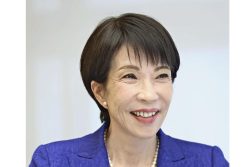
Japan’s Prime Minister: 2-Year Tax Cut on Food Possible Without Issuing Bonds
JN ACCESS RANKING
-

Japan Institute to Use Domestic Commercial Optical Lattice Clock to Set Japan Standard Time
-

Man Infected with Measles May Have Come in Contact with Many People in Tokyo, Went to Store, Restaurant Around When Symptoms Emerged
-

China Eyes Rare Earth Foothold in Malaysia to Maintain Dominance, Counter Japan, U.S.
-

Israeli Ambassador to Japan Speaks about Japan’s Role in the Reconstruction of Gaza
-

Japan, Qatar Ministers Agree on Need for Stable Energy Supplies; Motegi, Qatari Prime Minister Al-Thani Affirm Commitment to Cooperation



